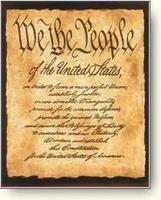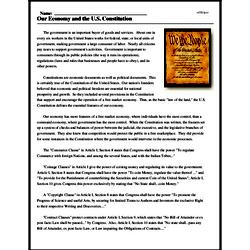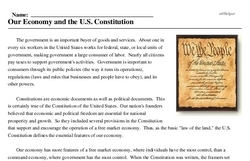Our Economy and the U.S. Constitution
The government is an important buyer of goods and services. About one in every six workers in the United States works for federal, state, or local units of government, making government a large consumer of labor. Nearly all citizens pay taxes to support government's activities. Government is important to consumers through its public policies (the way it runs its operations), regulations (laws and rules that businesses and people have to obey), and its other powers.
Constitutions are economic documents as well as political documents. This is certainly true of the Constitution of the United States. Our nation's founders believed that economic and political freedom are essential for national prosperity and growth. So they included several provisions in the Constitution that support and encourage the operation of a free market economy. Thus, as the basic "law of the land," the U.S. Constitution defines the essential features of our economy.
Our economy has more features of a free market economy, where individuals have the most control, than a command economy, where government has the most control. When the Constitution was written, the framers set up a system of checks and balances of power between the judicial, the executive, and the legislative branches of government. They also knew that competition would protect the public in a free marketplace. They did provide for some instances in the Constitution where the government would intervene in the economic processes.
The "Commerce Clause" in Article I, Section 8 states that Congress shall have the power "To regulate Commerce with foreign Nations, and among the several States, and with the Indian Tribes..."
"Coinage Clauses" in Article I give the power of coining money and regulating its value to the government. Article I, Section 8 states that Congress shall have the power "To coin Money, regulate the value thereof ..." and "To provide for the Punishment of counterfeiting the Securities and current Coin of the United States"; Article I, Section 10 gives Congress this power exclusively by stating that "No State shall...coin Money."
A "Copyright Clause" in Article I, Section 8 states that Congress shall have the power "To promote the Progress of Science and useful Arts, by securing for limited Times to Authors and Inventors the exclusive Right to their respective Writing and Discoveries...."
"Contract Clauses" protect contracts under Article I, Section 9, which states that "No Bill of Attainder or ex post facto Law shall be passed..." by Congress. Also, Article I, Section 10 states that "No state shall...pass any Bill of Attainder, ex post facto Law, or Law impairing the Obligations of Contracts...."
"Export Clauses" in Article I, Section 9 states that "No Tax or Duty shall be laid on Articles exported from any State...," and Article I, Section 10 states "No State shall without the Consent of the Congress, lay any Imposts or Duties on Imports or Exports...."




